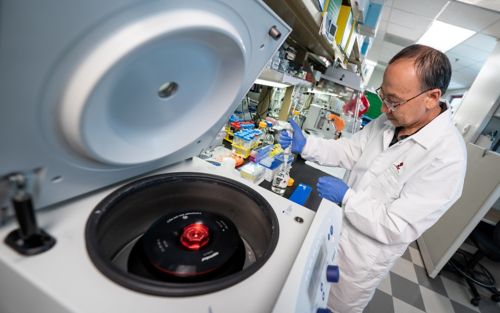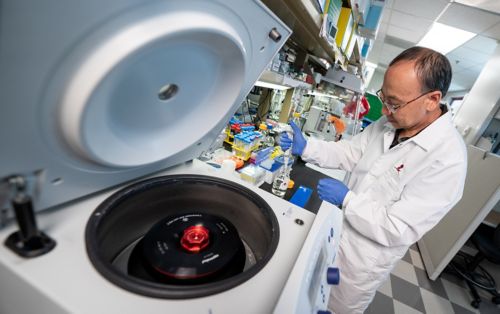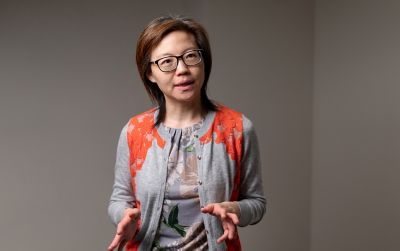St. Jude Family of Websites
Explore our cutting edge research, world-class patient care, career opportunities and more.
St. Jude Children's Research Hospital Home

- Fundraising
St. Jude Family of Websites
Explore our cutting edge research, world-class patient care, career opportunities and more.
St. Jude Children's Research Hospital Home

- Fundraising
Lu Wang Lab
Genomic profiling of rare tumors and functional characterization of oncogenic gene fusions in tumorigenesis
About the Lu Wang Lab
Effective treatment and management of pediatric tumors require a thorough and accurate molecular characterization. Advanced technologies allow molecular pathologists to discover the molecular composition of tumors and determine the mechanisms that drive tumor development and growth. Our lab explores the novel but recurrent molecular findings we encounter in clinical diagnostic work, characterize and evaluate the molecular role in oncogenic transformation, and further classify tumor subtypes that may lead to unique clinical trials for pediatric cancer patients with characteristic molecular markers.

Our research summary
At the heart of effective cancer treatment is a comprehensive and accurate diagnosis that accounts for a tumor’s unique molecular profiling of genetic alterations. Research in our laboratory is a direct extension of molecular diagnostics, which involves the use of cutting-edge technologies and platforms, including whole genome sequencing, whole transcriptome sequencing, and methylation array, among others, to provide an advanced molecular classification of rare pediatric tumors. Our work also functionally characterizes the genetic alterations that are considered to drive tumors.
While we are on the forefront of new molecular findings almost every day with respect to cancer, many of these findings require functional characterization to determine the specific tumor subtypes and their genetic drivers. Our lab conducts functional studies of recurrent and potential driver genetic alterations in rare tumors. We specifically focus on gene fusions that, in turn, may drive the development of new treatment approaches and lead to clinical trials that study the efficacy of those approaches. Indeed, there have been insights and clinical benefits gained through detailed studies of several individual gene fusions over the past decades, especially receptor kinase fusions. Compared to receptor kinase fusions, transcription factor fusions turn out to be poor targets for treatment. A more detailed understanding of how they are regulated, what downstream targets they affect and in which cellular processes they interfere will provide vital clues to finding new therapies for patients.
Examples of recent contributions from our lab include functional characterization of the HEY1::NCOA2 fusion gene in molecular pathogenesis of mesenchymal chondrosarcoma. Our lab has developed an in vitro model for studying mesenchymal chondrosarcoma using stably transduced iPSC-derived mesenchymal stem cells (iPSC-MSCs) with inducible expression of HEY1::NCOA2 fusion. Using the established in vitro cell model, we have identified several cancer related pathways that are directly up-regulated by the HEY1-NCOA2 fusion protein, including the PDGF/PI3K/AKT axis and IGF signaling. These findings provide rationales for exploring the corresponding signaling pathway inhibitions in treating mesenchymal chondrosarcoma.

We are advancing this line of research inquiry through a recent award from the Sarcoma Foundation of America to determine the impact on chondrogenic lineage differentiation and dysregulated pathways resulting from the expression of the HEY1::NCOA2 fusion gene and further elaborate the PDGF/PI3K/AKT axis in the tumorigenesis of mesenchymal chondrosarcoma and implications for anticancer therapy.
Ongoing projects are addressing further questions in mesenchymal chondrosarcoma tumorigenesis and several rare leukemia subtypes using whole genome and whole transcriptome sequencing, ChIP-seq, high-throughput compound screens, and proteomic approaches. All our work seeks to advance therapies for difficult-to-treat cancers.
Publications
Contact us
Lu Wang, MD, PhD
Associate Member
Department of Pathology
MS 1160, Room I6106
St. Jude Children's Research Hospital
Follow Us


Memphis, TN, 38105-3678 USA GET DIRECTIONS